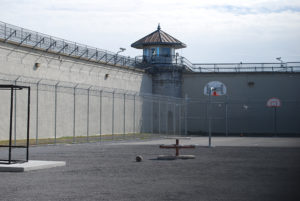Book Review: Bleak Walls, Bright Minds: In Their Own Words

Note: Travis W. of Iowa State Penitentiary wrote a chapter of this book. He is a member of one of the American Humanist Association’s first prison chapters and has written Inside the Walls columns for the AHA’s Humanist magazine. His chapter of this book provides a secular perspective.
Bleak Walls, Bright Minds: In Their Own Words by Sue Hutchins is a collection of written works by twenty-seven people who are each serving a sentence of life without parole in Iowa prisons. They have committed some of the most serious offenses under Iowa law and have spent years in confinement trying to make some kind of sense of their sentences. They have grappled with questions about what they have done and how to move forward from it. They are proud to explain how they have educated themselves, mentored each other, or discovered a passion for a talent or a cause. Some challenge the concept of justice as it applies to their cases. Some work to stay connected to family. Each story is different, but they have in common the likelihood that the writers will never live a life outside of prison. Iowa’s constitution grants the governor the power to commute a life sentence, but in recent history this power has rarely been used. The author reviews Iowa’s commutation record and discusses ways in which judicial thinking has changed toward life without parole. She then offers the reader the opportunity to hear about life behind bars from people who live there.
 As a behavioral therapist, author Sue Hutchins has always been interested in helping families. About 20 years ago she began working with the Federal Bureau of Prisons in Las Cruces, NM, to assist inmates returning to their families. When she retired and moved to Iowa, Sue joined or was involved in the creation of several non-profits supporting incarcerated individuals, their families, and prison reform. She is co-chair and one of the founding members of the Iowa Justice Action Network, board member and current co-vice president of Citizens United for the Rehabilitation of Errants (Iowa CURE), and founder of Living Beyond the Bars. These organizations work to help families affected by Iowa’s prison system and they connected concerned families with Sue in a project that resulted in this book.
As a behavioral therapist, author Sue Hutchins has always been interested in helping families. About 20 years ago she began working with the Federal Bureau of Prisons in Las Cruces, NM, to assist inmates returning to their families. When she retired and moved to Iowa, Sue joined or was involved in the creation of several non-profits supporting incarcerated individuals, their families, and prison reform. She is co-chair and one of the founding members of the Iowa Justice Action Network, board member and current co-vice president of Citizens United for the Rehabilitation of Errants (Iowa CURE), and founder of Living Beyond the Bars. These organizations work to help families affected by Iowa’s prison system and they connected concerned families with Sue in a project that resulted in this book.
The author summarizes Iowa’s historical and political impact on second chances for adult “lifers.” She explains why pardons by the governors of Iowa have decreased dramatically since the 1980s, even as prisons have become overcrowded and expensive to run.
Many of the writings in this book come from people who committed violent crimes during the ages of 18-25. In contrast to the situation in Iowa, courts have taken neurological research into account when sentencing juveniles, and in 2016 the U.S. Supreme Court declared a mandatory sentence of life without parole unconstitutional for juveniles. Scientists discovered that impulse control is not fully functional until the frontal cortex matures in the mid to late twenties. Poor or impulsive decisions made prior to that age might not be made later in life when the brain has fully matured. Indeed, when juveniles are incarcerated for long periods of time, then paroled when they are older, the rate of recidivism—rearrest, reconviction or return to prison—is near zero for those individuals. Expanding the definition of “juvenile” to age 25 for sentencing purposes would more closely align one’s age with one’s neurological development. At the end of the book, the author reviews some steps toward that reform that are under discussion in Iowa. It is painful to read that someone who has been in prison for 25 years or more, who has been trained in a job that contributes to the prison community or who has become involved in a charity or hospice or made any number of positive life choices, is not allowed to petition for a parole hearing because the definition of “juvenile” is not yet based on science.
Bleak Walls, Bright Minds: In Their Own Words may provoke the reader to more closely scrutinize our prison system. Theoretically, community safety is achieved by incarcerating offenders. The system professes a goal of rehabilitation and offers inmates education and other programs toward that goal. The system also judges the success of rehabilitation and, when successful, guides the transition back to life outside the prison so that parolees do not reoffend, their lives are successful, and the public remains safe. In such a system, what can possibly be the value of a sentence of life without the possibility of parole? Why is the investment made in an inmate squandered by not completing the cycle? Why can’t any prisoner petition for review if certain criteria are met? Stories in this book tell of personal struggles, of lessons learned and changes made, of remorse and reform. Not everyone in prison makes such changes, but when they do—shouldn’t they become eligible for parole?
You will probably not read Bleak Walls, Bright Minds for pleasure; rather, you will read it for perspective. This book is an important look at a world unfamiliar to most of us and about which we have gotten much of our information from works of fiction. We are trained, in a sense, to expect danger and drama from prisoners, so we tend to think incarceration is a sensible option. This book is non-fiction. These writers are real people. They write about how they have tried to create lives of purpose. They want acknowledgment of their efforts. So much of prison reform focuses on the parole process and the successful transition out of prison, but these writers will not benefit from that kind of reform. They get no parole; they are in prison for life. They want to tell you why that needs to change.
